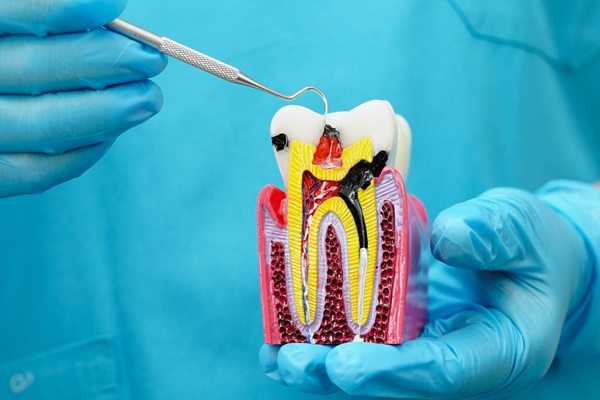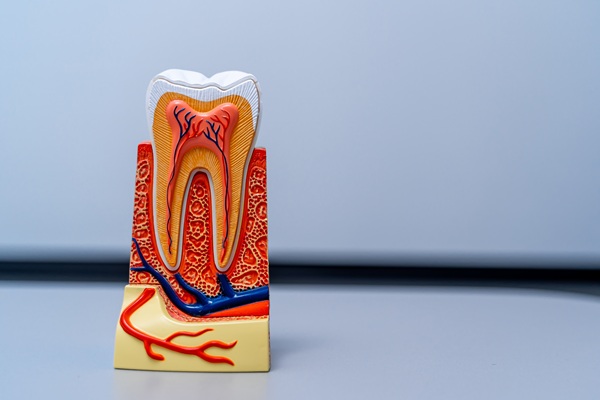Pulpotomy Versus Pulpectomy: An Endodontist’s Perspective

An endodontist is a highly skilled dentist who focuses on saving teeth. Endodontists can perform particular procedures to restore health to a damaged tooth. These include pulpotomies and pulpectomies. Read on to learn more about a pulpotomy and a pulpectomy.
Endodontist’s perspective
Pulpotomies and pulpectomies can both be recommended for decay, trauma or infection that has reached the tooth’s pulp. But these procedures are not the same. People who need any of them should see a dentist or endodontist. A person should know what the procedures involve so that the individual can make an informed decision. Here are some of the differences between the procedures.
Pulpotomy
During a pulpotomy, a health care provider removes the coronal pulp from a person’s tooth. This pulp sits within the main part of a person’s tooth, above the gumline. A pulpotomy is recommended for teeth that are still alive. The teeth should respond to temperature and also have sensation and vascular flow.
For the procedure to be effective, there should be no abscess in the region. There should also be no bone loss under the tooth or spontaneous pain. Most times, this procedure is done on baby teeth with pulp damage. But it can also be performed on permanent teeth with either trauma or cavities that reach the pulp.
Pulpectomy
A pulpectomy involves the removal of the pulp from all parts of a tooth. This includes pulp in the roots. This procedure is performed on teeth that are not alive. A pulpectomy can help treat primary teeth with dead pulp.
It can also treat permanent teeth with infected pulp or abscesses. This procedure involves the removal of all the contents of the inner chamber of the tooth. It often cleans the entire root canal. This protects it from further infection.
What to expect
An endodontist or a general dentist may perform these procedures on adult or baby teeth. Pediatric dentists also use them to treat young adult teeth and baby teeth. Both of these procedures involve a local anesthesia injection. This helps to numb the area of the mouth and tooth being treated. Once numbed, the health care provider will remove the dental decay from the tooth and then clear the pulp of bacteria. A rubber dam is usually used to isolate a person’s tooth from the rest of the mouth.
After receiving either one of the procedures, the tooth may be vulnerable to fracture, continued pain or discoloration. A person may also experience some discomfort from the inflamed tissue. A health care provider may recommend pain medication to provide relief. Afterward, the dentist will continue monitoring the patient’s healing. X-rays of the treated tooth may be obtained every six months.
Takeaway
If you are experiencing any dental problems, talk to your dentist. For a pulpotomy or pulpectomy, your dentist will provide guidance if you need either of them. The goal of these procedures is to provide pain relief. They can also help restore your dental health as well as tooth function. You and your dentist should work together to ensure that you receive the care you need.
Request an appointment here: https://santarosaendodontics.com or call Santa Rosa Endodontics at (707) 409-1177 for an appointment in our Ukiah office.
Check out what others are saying about our services on Yelp: Read our Yelp reviews.
Recent Posts
Root canal treatment is often the first line of defense for treating teeth with compromised pulp chambers. The pulp chamber is the innermost layer of a tooth, and it stores nerves, blood vessels, and connective tissues. The chamber is sealed off from the rest of the tooth to protect it against bacteria and other irritants…
A root canal can preserve and strengthen a severely damaged or infected tooth. When seeing a root canal dentist, asking informed questions can provide clarity, ease concerns, and improve treatment outcomes. Understanding the procedure helps make the experience more comfortable and ensures you are well-prepared for each step.While each patient's situation is unique, the following…
A person might need to see an endodontist for a wide variety of problems, mainly relating to how they can save patients’ teeth. All endodontists are dentists because they have completed dental school, but they do two more years of specialized study in the techniques used to preserve a person’s dentition. So, if you are…
When a root canal fails, a root canal retreatment must happen. Getting a root canal treatment is better than a dental extraction. If an endodontist sees that your tooth still has good bone support and healthy gums under or around it, a root canal can save the tooth. A root canal is a less expensive…


